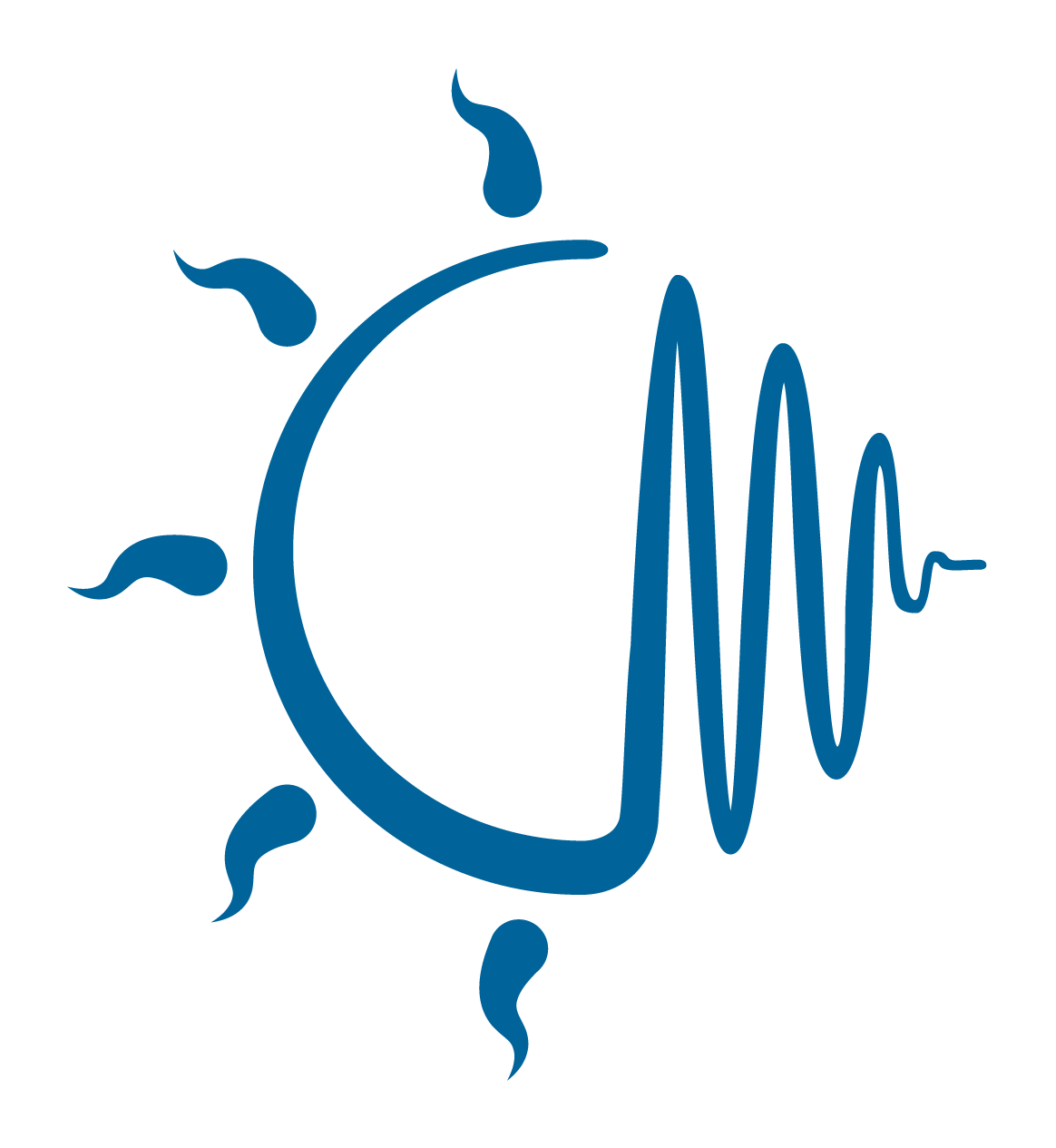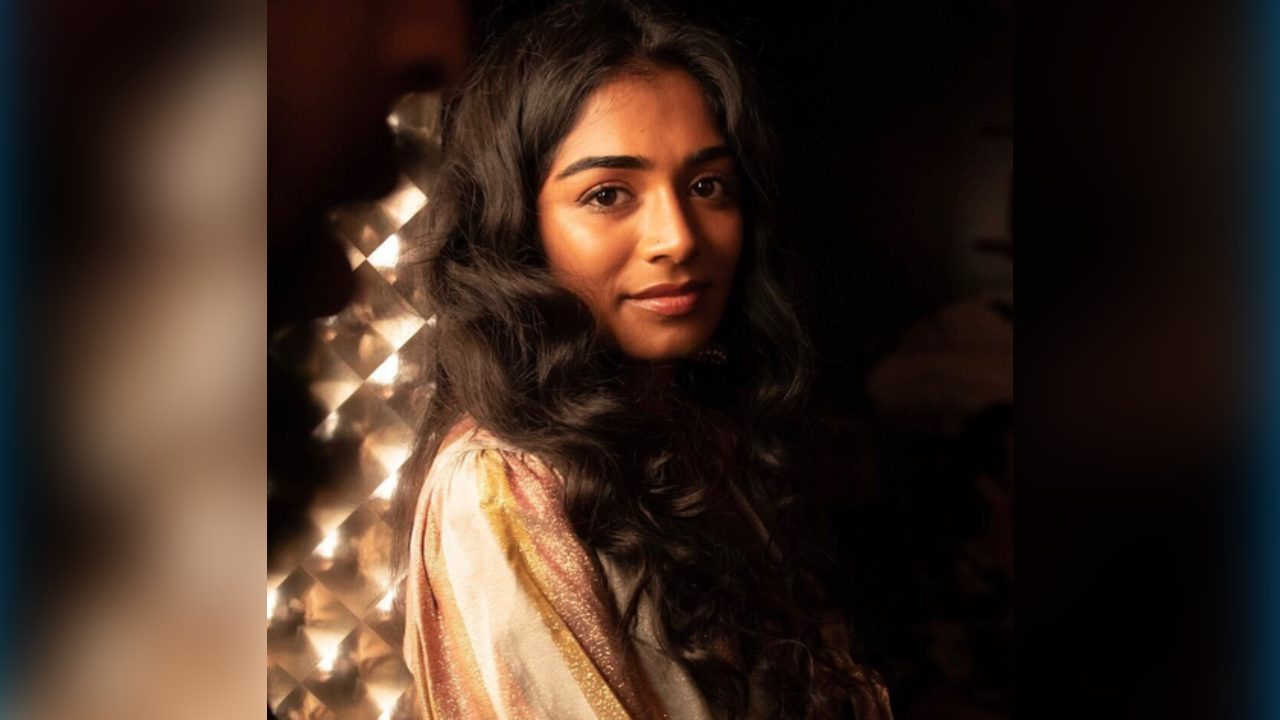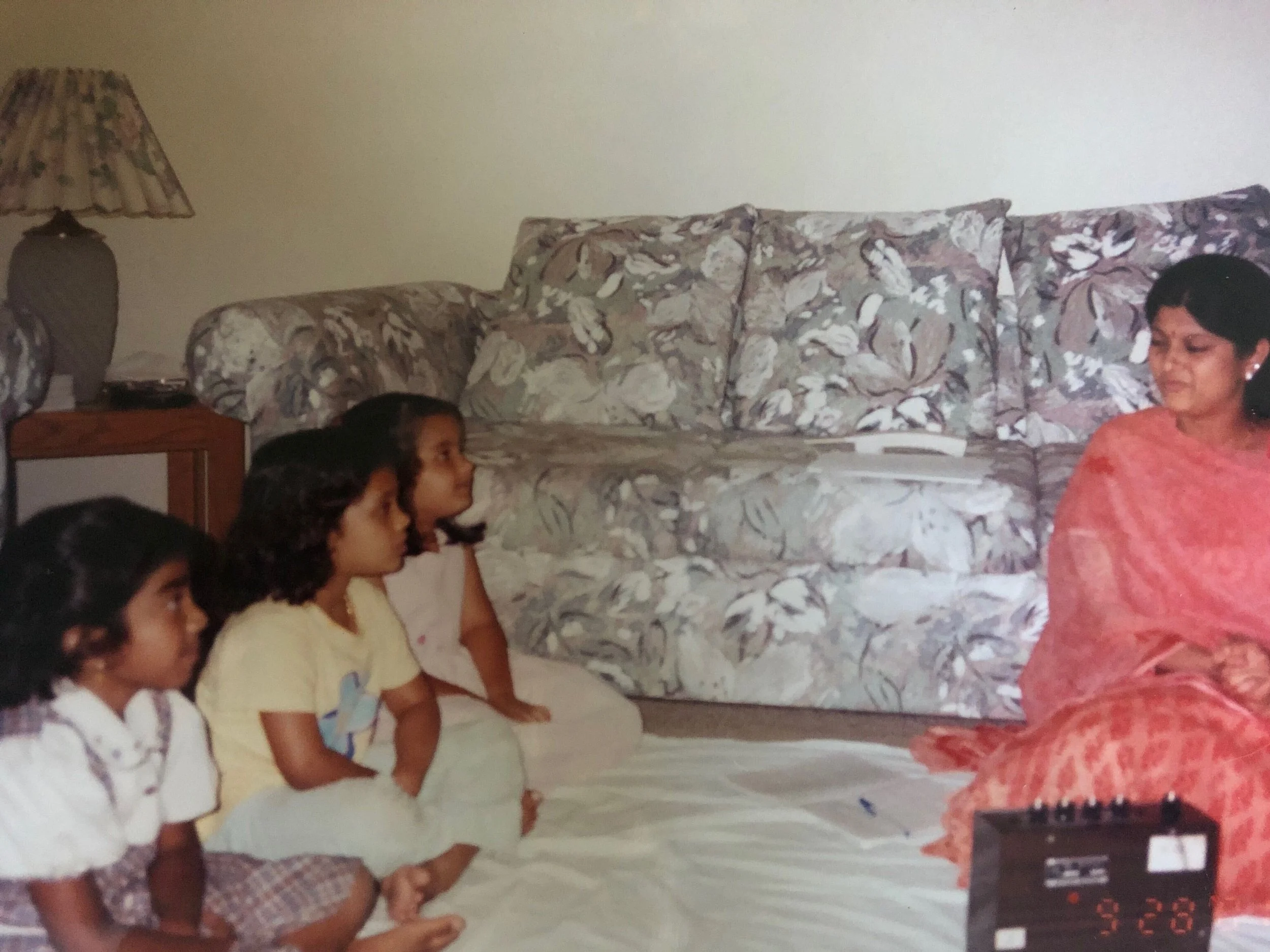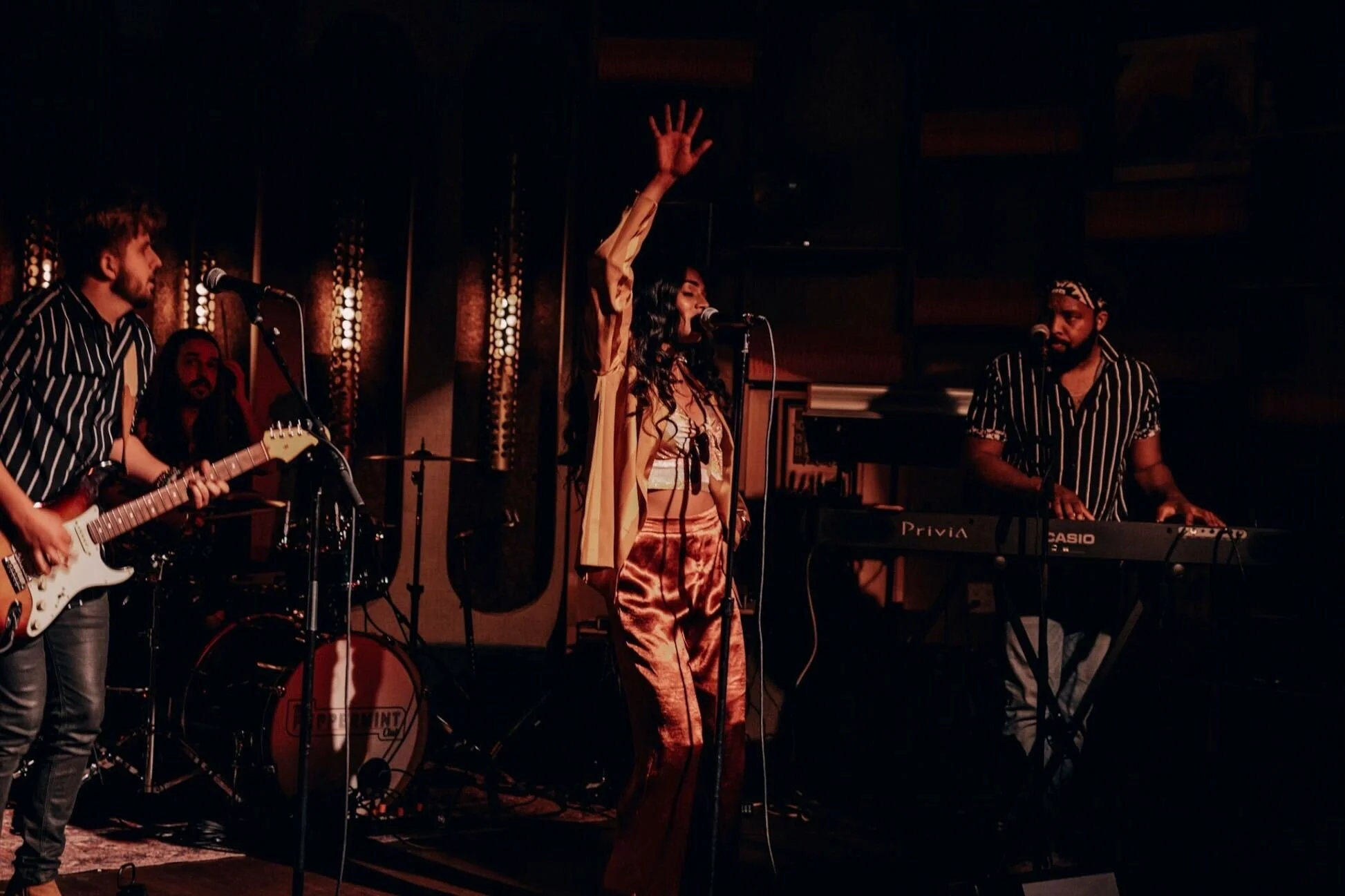rra team spotlight: anusha suresh
4 min
Hey y’all, it’s Meera and I’m here with an addition to our Ravi Ray Audio team spotlight series!
Bringing the sand and surf from the west coast, let’s meet our Innovation Lead, Anusha Suresh! Anusha has been essential in bringing her experience as an aspiring artist to help RRA navigate the business side of music through things like the NFT industry and Web3. Check out her blogs!
Anusha Suresh, who goes by the artist name, Anusha Savi as an homage to her grandmother and her culture, is a Tamil-American Pop/R&B artist born and raised in the East Bay Area. Anusha started Carnatic music lessons at the age of 4 and trained for 10 years. Throughout her childhood, she has performed in recitals put on by Latha Sriram’s music academy, poojas at temples in the Bay Area, and the Cleveland Thyagaraja Festival. Later, she attended the University of California, Davis, earning a degree in Cell Biology. She continued her love for singing and creating music with others by joining and leading The Spokes, an all-women identifying a cappella group. Upon graduating, her early career began as a management consultant in various industries such as medicine, tech, business and more.
After spending 3+ years in the corporate world, Anusha decided to leave the 9-5 behind and take a leap of faith to pursue music as an artist full-time. In 2021, she was selected to join the LAAMP (Los Angeles Academy for Artists and Music Producers), an artist development/songwriting program that is run by pop legend producers Stargate, where she and 49 other writers, artists, and producers would create 1-3 songs a week and connect with professionals actively working in the LA music industry. Now, as a recent graduate of LAAMP, she’s ready to take on the world with her music and bridge the gap between her Indian heritage and mainstream culture. She has played sets and headlined at legendary Los Angeles venues like The Peppermint Club, Kiss Kiss Bang Bang, the Takeoff Tour, and Flower and Flowers Festival.
I had a blast chatting with Anusha, so join me as we learn about her life as a singer-songwriter!
What drew you to singing? What do you love most about songwriting and performing?
My parents wanted me to be in touch with myself and our culture, so they put me in Carnatic music at a really young age. I’ve been singing since and in various forms like musicals, choir, and a cappella groups. I’ve always been drawn to how singing has allowed me to release an ephemeral feeling- it’s made me feel powerful, free, and like I’m accessing a higher power.
What I love most about songwriting is that it takes singing and creates an art form. I only started writing music 6 years ago, when I was 20, and the way it has challenged me to contemplate life and put a melody to it, is really amazing. It honestly feels mystical, as if creating a song and recording it is somehow breaking the laws of physics or bending it a way where I’m translating matter in the craziest form. As songwriters, we create something from nothing and we can’t fully see or touch it. We can only feel music. Performing also feels really spiritual because it forces me to be so present in that moment on stage with my audience. I can’t wait until I get to put on my own tour and build a set list around cool visuals and show elements that bring my music to a whole other magical level.
I’m also super excited to share that I will be releasing my first project/EP called Marigold this fall! It’s gonna be a pop R&B desi project that I feel really encapsulates who I am and where I’m at in my life. It’s my most ambitious and dreamy project yet - I’ve invested a lot into it and being intentional about every piece from most important songs, message, visuals, impact, community, etc.
Tell me about your first music teacher. What were they like and what lessons from them do you still use today?
Oh! You and this question are taking me back about 22 years or so (laughs)! I had a total of three formal teachers in my Carnatic training years. My first teacher was Ramanashri Auntie. She had an apartment in Dublin, California that my mom would drive me to from our home in Danville once a week. My first year of classes was in a group setting, so my friend, Archana, and I were in preschool when we started attending classes together. I also learned from Latha Sriram and Nandini Ramamurthy as I got older.
I don’t remember too many details from that time, but what I do recollect is that Ramanashri Auntie was the person who taught me the basics of Carnatic music e.g. talam, ragam, shruti, the varisais. Of all of these core concepts, I definitely use shruti the most in my music making now. Shruti is the ability to match and identify swarams (pitches or notes) accurately on the scale. It allows me to maneuver through scales very swiftly and with confidence. Having good shruti has been instrumental in my ablitly to learn music and create melody. We only have 12 notes to play with and having a good contorl of my shruti gives me the ability to maneuver through them swiftly
Especially this past year in my singing and songwriting for my artist project, I’ve embraced the Carnatic principles of singing, song structure, and arrangement. For example, when songwriting, I sometimes play with different ragas or transpose a raga with all different inflections and microtones and impose that onto a western scale to bring those sounds into a pop realm. It’s always really fun to play around and also take a step to be intentional about the choice to integrate my diverse musical backgrounds as a first gen immigrant girl from the bay together in an authentic and interesting way. Outside of a technical perspective, Carnatic teachings taught me singing is a skill that requires practice every day just like any instrument, sport, or hobby. My first year of classes really unconsciously instilled that in me. This is a gift and I have to build it through practice.
You recently completed the LAAMP Program, congratulations! What was your experience like and how have you changed as an artist?
Yes! I’m officially a LAAMP (Los Angeles Academy for Artists and Music Production) graduate which is so surreal and crazy to say. Before embarking at LAAMP, I was unsure of my true identity as an artist, and how to take real big swings to get closer to my dreams, but this experience gave me the direction I needed which has helped me feel 100% committed to pursuing music an genuinely believe in myself. I have faith that I will get to where I want to go.
Along with uncertainty of the music industry, my number on struggle in themusic world has been my inconsistent confidence. I was self-aware enough to know what was holding me back, but I just kept wondering “Can I do this? Am I allowed to do this? Will I succeed? Am I good enough?” All these questions were just hurdles keeping me from diving head-on into music. LAAMP forced me to confront these feelings every day and provided a safe space to ask those questions. I felt reassured and supported by peers, friends and collaborators who would say “No you’ve got this, you were picked by Stargate and accepted this program for a reason. Just keep going” or those who would lift me up by writing a song with me to work through whatever I was feeling. We could be really free to explore that and helped me build myself up little by little in a very real way That confidence has become integral to the artist I am today and whenever I feel unsure of the road ahead, that confidence in my purpose helps ground me. Also, LAAMP really pushed me as a writer and artist. With the expectation to write 1+ song a week, I really had to dig deep to find the stories that I needed to tell. Or help write a song that another artist wants to talk about and be there with them to help them shwocase what’s real for them. In my own writing as an artist, I solidified myself on writing about things that had purpose to me, like connecting with other women, the South Asian community, or people in their 20s, and more. Genuinely, I found my purpose in creating music that would connect with someone. By forcing myself not to be safe in my writing, I loved creating music that I not only loved to sing but also had a strong message behind it.
I feel really lucky to have had this experience because this process propelled me into the music industry and I got to learn perspectives from all kinds of professionals which is so incredibly valuable. I even got to meet with artists like Ne-Yo, Tayla Parks, Ant Clemons, Emily Warren and more, and get their feedback on my music, chat with them, or learn from their own stories coming up in the business - which was a huge honor.
How do you deal with performance anxiety? Do you have a routine or lucky charm?
This is a very real question. I deal with performance anxiety in a few ways. One way is by profusely drinking warm water to keep my throat hydrated and unstrained because ahead of a show or performance, I’m always worried my voice is going to crap out on me. Another way I deal with it is by looking at my song sheets last minute. I don’t do it as much anymore, but early on I would get so paranoid that I was going to forget the words of a song. One time in high school, I went to perform a solo from Les Miserables and I totally forgot the lines and just sang on the syllables for the entire time. It ended up working and everyone said I sounded good, but ever since then, lyrics have been a sore spot. These two are definitely bad bandaid fixes but I do have some more healthy coping mechanisms now.
Every time I perform mostly, I feel like a ball of energy amped up to perform, but I need to learn how to stay calm and control it. Controlling that energy is really important, so I do a lot of breathing exercises and pranayama to center myself. It also mainly helps with my breath control, so I can contract my diaphragm and know how to use my air when I’m singing.
I don’t necessarily have a lucky charm or haven’t had one until this past show when I had a Rudrakshara bead I got when I visited the Hindu monastery in Kauai, Hawaii. It’s said to be really helpful to singers and creators in increasing their confidence and openness in their voice. I had it in my right pocket in my last show and got pretty great feedback! It felt especially good to sing that day and so it might be my lucky charm from here on out! We shall see…
The best advice that helped you transition from corporate life to life as an artist?
The best advice that I got, which kind of relates to the transition from corporate life to creative life and career perseverance generally, was from Rob Kinelski (who is a legendary mixing engineer who’s worked on Billie Eilish’s albums and much more). He came to LAAMP and said that “You only lose if you quit.” with regards to ‘making it’ in the biz. That really stuck with me because a big reason I was scared about taking the leap from corporate to creative was this feeling that I was going to fail. I was scared I wasn’t going to be able to live the life that I wanted. I also recognize my privilege in being able to say no to the financial security my comfortable corporate job gave me, but I wasn’t happy, my mental health was suffering.
What Rob said really unlocked something in me to give myself my permission to do this. It was a wake-up call that here someone who is an incredible industry maven saying this to my class. He was part of this team of other artists, engineers, and professionals that all popped off at different times, but all made it because they stuck with it. He said he doesn’t know a single person who has genuinely invested in making music and didn’t make it. I have chosen to believe in that wholeheartedly and that is what drives me today.
If you could change one thing about the music industry, what would it be and why?
Oh this is a hard question because I think there are a lot of things I would change, especially that the music industry operates from like an equity perspective (songwriter rights, royalities, fair deals, etc). But if I could wave my hand right now and get rid of one thing, from a safety perspective, it would be the sexual harassment, misogyny, queerphobia, and inappropriate behavior that unfortunately happens all too frequently. The industry could be a lot better about creating a safe environment for all people. Even in a post #metoo world, there are a lot of risky situations that happen in music that I’ve encountered myself and especially as a woman or even to people I’ve seen, that I had to figure out how to navigate without trying to alert somebody or piss somebody off even when I might feel like I’m in danger. The industry has a responsibility to go further and enforce the rules of inappropriate behavior for those people who hold the power of creating opportunities and spaces for artists. There’s a lack of accountability because the music industry doesn’t have aformal HR department like corporate jobs or like many other industries, so this acts as leeway for predators. It also creates a tough culture to maneuver for someone who wants to stand up for the right thing and bring justice to keep people safe. Sometimes when there’s a lot at stake and industry favors business, it feels like the goodwill to transition away from that misogynistic culture is a messy, sticky web. It really disgusts me and makes me sad. It is something that so many of us have had to deal with or know of someone and I think we should keep fighting for that change.
Fast facts:
First album you bought: …Baby One More Time My parents actually bought this for me!
One song that describes you: This is an impossible question because I have a lot of songs that describe me, but I think the one that’s left the greatest impact is I Was Here by Beyoncé. This song has really helped me empower myself and make me feel like I’m worth something. It’s a message that’s really important to me and so I carried it on in my own soon-to-release records
Favorite Tamil song growing up: Kandukondein Kandukondein is one of my favorite albums of all time. A.R. Rahman is a genius. The song Kanamoochi from the album is one that always makes me smile with how pretty, soulful, and flirty it is. It’s the best
Artist you want to open for: I would literally be in heaven if I opened for Beyoncé! She’s my favorite artist to have ever existed. period.
Favorite live performance you’ve attended: I will list my top 3 because this is really hard (laughs)
Beyoncé and Jay-Z at the On The Run Part 2 tour at Levi Park Stadium in 2018
Swedish House Mafia and The Weeknd at Coachella this year
Cam at Bimbo’s 365 Club in San Fransico in 2017
After chatting with Anusha, I am so inspired by her story and insight. Even though I’m not a musician, the optimism she exudes in following her passion is so infectious to any fellow creative. You can tell how much Anusha cares about her craft and the kind of positive impact she hopes to make on the world through her music. I know she’ll go far and it’s only a matter of time before we’ll see her on a billboard! Don’t forget to look out for her first EP Marigold releasing this fall and stream her most recent song “Therapy”
(Are you an aspiring artist or musician? Do you want to create high-quality original music, covers, or mixes? Learn about how RRA can help you elevate your music here!)
Stay well, shine bright.
~Meera



